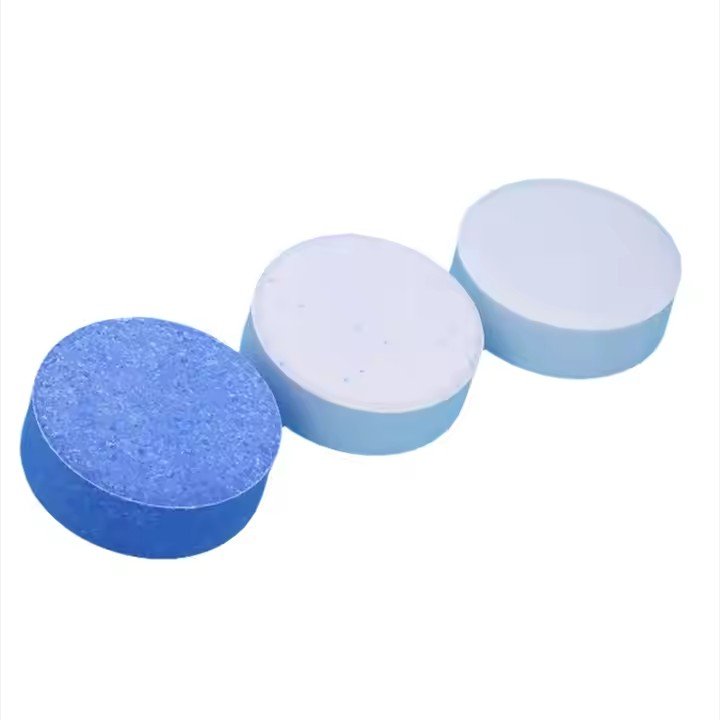When it comes to maintaining clean and safe water in swimming pools, chlorine tablets are one of the most effective and widely used disinfectants. They help sanitize the water by killing harmful bacteria, viruses, and algae, ensuring that the pool water is safe for swimmers. However, the effectiveness of chlorine tablets can be significantly influenced by the pH level of the pool water.

The Importance of pH Levels in Pool Water
The pH level of pool water refers to its acidity or alkalinity. The pH scale ranges from 0 to 14, with 7 being neutral, values below 7 indicating acidity, and values above 7 indicating alkalinity. Maintaining the right pH level is crucial for several reasons:
Swimmer Comfort: Extreme pH levels can cause irritation to the skin and eyes.
Effectiveness of Pool Chemicals: The pH level directly affects the performance of pool chemicals, including chlorine tablets. If the pH is too high or too low, chlorine tablets may not work as effectively, leading to poor water quality.
Corrosion and Scale Build-up: Incorrect pH levels can cause damage to the pool equipment, leading to corrosion or scale formation on the pool surfaces.
The ideal pH level for pool water is between 7.2 and 7.8. Within this range, chlorine tablets perform at their best, effectively disinfecting the water and maintaining a safe swimming environment.
The Effects of pH on Pool Chlorine Efficiency
1. Low pH (Acidic Water)
When the pH of the pool water is too low (acidic), there is an increased concentration of hypochlorous acid (HOCl). While this form of chlorine is highly effective in sanitizing the pool water, excessively low pH can lead to a number of issues:
Corrosion of Pool Equipment: Acidic water can cause damage to pool equipment, including ladders, filters, and pumps. It can also lead to the deterioration of pool surfaces, such as tiles or vinyl liners.
Skin and Eye Irritation: Swimmers may experience irritation to their skin and eyes if the water is too acidic, making the pool uncomfortable to use.
Increased Chlorine Consumption: Though HOCl is more effective, consistently low pH may lead to an imbalance in the chlorine demand, requiring more frequent use of chlorine tablets to maintain sanitization levels.
2. Optimal pH Range (7.2 to 7.8)
In this ideal range, chlorine tablets are most effective, with the proper balance between hypochlorous acid and hypochlorite ions. When the pH is balanced, chlorine tablets can efficiently kill bacteria, neutralize viruses, and control algae without requiring excessive amounts of chlorine. Regularly testing and adjusting the pH level ensures that the pool water remains clean and safe for swimmers.
3. High pH (Alkaline Water)
When the pH of pool water becomes too high (alkaline), the concentration of hypochlorite ions (OCl-) increases, reducing the disinfecting power of chlorine tablets. The higher the pH, the less effective chlorine becomes in killing pathogens. This results in several potential problems:
Increased Risk of Algae Growth: Since chlorine is less effective in high pH conditions, algae and bacteria may begin to thrive, causing the pool water to become cloudy and unsafe.
Scaling on Pool Surfaces: High pH levels can lead to calcium and other minerals precipitating out of the water, forming scale on pool surfaces and plumbing.
Chlorine Inefficiency: You may find that more chlorine tablets are required to achieve the same disinfection effect, increasing chemical costs and maintenance efforts.
How to Manage pH Levels for Optimal Chlorine Tablet Effectiveness
Maintaining the right pH level for pool water is a crucial part of pool maintenance. Here’s how you can keep the pH in check:
1. Test the pH Regularly:
Use a reliable pH testing kit to monitor the water’s pH levels. It’s important to test the water frequently to ensure that the pH stays within the ideal range of 7.2 to 7.8.
2. Add pH Adjusters:
If the pH is too low, use a pH increaser (alkalinity buffer) to raise the pH. If it’s too high, use a pH decreaser (muriatic acid or sodium bisulfate) to lower the pH.
3. Use a Reliable Source for Chlorine Tablets:
For consistent pool care, consider buying wholesale chlorine tablets from trusted suppliers to ensure you always have access to high-quality products at competitive prices. If you’re looking for bulk orders, a chlorine tablets factory can offer reliable supply options tailored to your pool maintenance needs.
Conclusion
Understanding the relationship between pH levels and the effectiveness of chlorine tablets is essential for proper pool maintenance. By maintaining the optimal pH range, you can maximize the disinfecting power of chlorine tablets, ensuring that your pool remains clean, safe, and enjoyable for swimmers. Whether you are managing a residential or commercial pool, always monitor and adjust the pH regularly, and consider sourcing your chlorine tablets from a trusted chlorine tablets factory or wholesale chlorine tablets supplier to ensure high-quality and cost-effective solutions.
